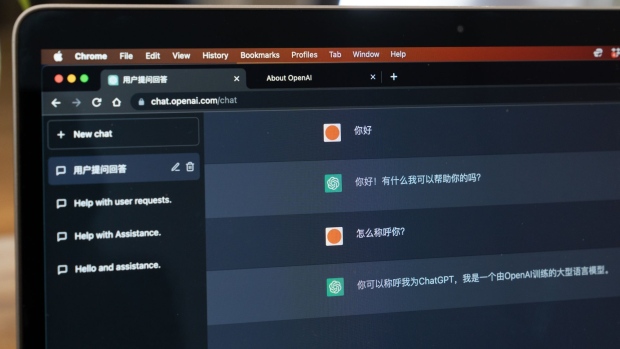Feb 24, 2023
China Prepares to Police AI as ChatGPT Frenzy Spreads
, Bloomberg News

(Bloomberg) -- China will introduce rules to govern the use of artificial intelligence across a swath of industries, moving to regulate emergent spheres as ChatGPT fever sweeps the world’s No. 2 economy.
The government will push for the safe and controllable application of AI services, which it considers a strategic industry, officials from the Ministry of Science and Technology told reporters on Friday. And it will continue to monitor its evolution over the longer term to gain a better understanding of the ethical concerns surrounding AI and other transformative technologies, Science Minister Wang Zhigang said.
San Francisco-based OpenAI’s conversational bot has captivated users since its rollout months ago, prompting a plethora of American and Chinese corporations to unveil similar projects and inflaming AI-linked stocks. Wang’s remarks follow reports that regulators have forced Chinese apps and websites to terminate services that route users to ChatGPT, in part because of content and data security concerns.
The introduction of regulations may be intended to ensure ChatGPT-like services hew to the Communist Party’s non-negotiable censorship of controversial or undesirable content online. But it could also be a boon to companies like Baidu Inc., providing clearer ground rules for future services.
Chinese AI-related stocks rallied Friday after the ministry’s proclamation. Beijing Deep Glint Technology Co. jumped more than 3%, 360 Security Technology Inc. gained as much as 7% and AI chipmaker Cambricon Technologies Corp. surged 7.3%.
Read more: ChatGPT Lookalikes Proliferate in China on Tencent’s WeChat
About three weeks ago, Baidu’s shares soared 13% after Bloomberg News first reported its plans for a ChatGPT-like service. It has since reaffirmed plans to roll out its Ernie Bot conversational AI in March, while Alibaba Group Holding Ltd. has said it’s working to integrate generative AI in several of its products. Other high-profile Chinese enterprises, including brokerage China International Capital Corp Ltd., are already experimenting with the technology’s potential to transform everything from finance to health care.
“We have to see that ChatGPT is doing very well,” Wang said at Friday’s briefing. “Following the emergence of a new technology, including AI, our country will introduce relevant measures (to regulate them) in an ethical manner.”
The field of AI is among several in which the US and China are racing for the lead, part of a broader struggle for technology and geopolitical supremacy. Some experts believe the Asian power has the edge in terms of the sheer amounts of data required to train AI platforms.
A parallel race among global tech giants has intensified since ChatGPT took the internet by storm. Microsoft Corp., which owns a stake in OpenAI, showed off how the technology could supplement its Bing search engine. Not to be outdone, Google demonstrated a novel service called Bard that would incorporate similar features.
It’s unclear however how Beijing views private sector involvement in the sensitive field, particularly given a deep-seated suspicion of increasingly powerful internet firms that resulted in crackdowns on sector leaders from Ant Group Co. to Alibaba and Didi Global Inc.
ChatGPT’s users have pointed to the dangers of abusing the technology, from the ability to draw out disturbing responses to its longer-term ability to displace humans at work.
Wang said it will take time to draw up Chinese regulations.
The regulatory measures “will come after we understand the technology,” he said.
(Updates with share action from the fifth paragraph)
©2023 Bloomberg L.P.





